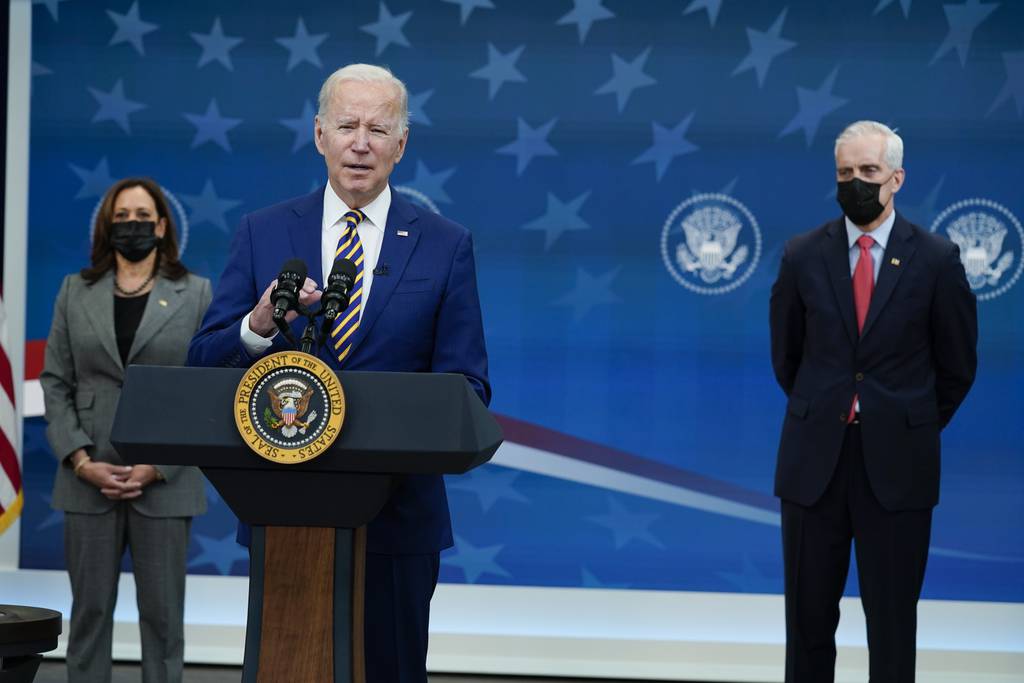Democrats in Congress are pressing the Biden administration to extend the suspension of student loan payments before it’s set to expire May 1 as they seek to avoid cutting off a pandemic-induced benefit in the middle of an election year.
The federal student loan payments suspension has already been extended five times throughout the COVID-19 pandemic since it began under former President Trump in March 2020.
That means millions of people who owe student loans to the federal government haven’t been required to make payments on their debt in two years, all while interest rates on those loans have been set to zero.
But President Biden has yet to say whether he’ll renew it again, after last extending it in December amid surging cases of COVID-19.
The freeze on federal student loan payments has had more staying power than other popular federal aid programs designed to help people stay afloat during the pandemic.
By contrast, the ban on evictions, enhanced unemployment benefits and expanded child tax credit have all lapsed over the past year.
And the longer that millions of people have adapted to budgets that don’t include monthly student loan payments, the harder it will be for Democrats to reinstate them.
Dozens of Democrats are calling for an extension that lasts at least through the end of this year.
“Millions of borrowers have benefitted from the pause in payments. Although progress has been made, we believe it is vital to ensure that we continue to work to alleviate the continued impact the pandemic is having on families across the country,” a group of more than 40 House Democrats ranging from progressives to lawmakers in competitive districts wrote in a letter to Biden this week.
They warned that ending the pause on student loan payments this spring would come at a time when Americans’ cost of living has already been going up due to the recent spike in inflation.
“Unemployment remains higher than two years ago, and families are experiencing significant price increases on household goods, food, and energy,” the Democratic lawmakers wrote.
The letter’s signatories included Reps. Conor Lamb (Pa.) and Tim Ryan(Ohio), who are running for the Senate, and progressive Rep. Rashida Tlaib(D-Mich.).
But some of Biden’s allies are urging him not to stop there.
Many progressives — and even some top Democrats like Senate Majority Leader Charles Schumer (N.Y.) — are further urging Biden to cancel student loan debt altogether.
“Without action, student loan payments will resume on May 1. President Biden can act now by using his existing legal authority to #CancelStudentDebt,” Schumer tweeted on Tuesday.
Senate Health, Education, Labor, and Pensions Committee Chairwoman Patty Murray (D-Wash.) similarly called for extending the freeze until at least next year while using that time to reform the student loan system.
Her proposals included forgiving some debt for low-income borrowers or those who left college without completing a degree and clearing negative credit histories for borrowers who were in default before the payment pause.
“We’re talking about a policy failure that has financial consequences that keep people in jobs they don’t like, prevent them from buying houses or starting families—or force them to choose between making their loan payments and paying for groceries, rent, or health care,” Murray said last week.
Schumer and other Democrats, including Sen. Elizabeth Warren (D-Mass.), have called on Biden to cancel $50,000 worth of student debt per borrower.
And the Congressional Progressive Caucus last week outlined a series of proposed executive action agenda items — as the sprawling “Build Back Better” legislation remains stalled on Capitol Hill — that included canceling federal student loan debt.
“Extending the payment pause just isn’t enough. We need to cancel every last penny of student debt, once and for all,” Rep. Pramila Jayapal (D-Wash.), the Progressive Caucus leader, tweeted this week.
Biden previously pledged to cancel at least $10,000 of student debt as a presidential candidate in 2020. But Biden has stopped short of going as high as $50,000, and his administration has expressed doubts about his authority to unilaterally cancel debt.
The Biden administration has taken other actions in the meantime to help borrowers, including by providing $7 billion in loan relief for 401,000 people with permanent disabilities and overhauling a program that forgives borrowers’ debts after 10 years of public service.
White House chief of staff Ron Klain indicated earlier this month that the Biden administration is considering once again renewing the freeze on student loan payments.
“The president is going to look at what we should do on student debt before the pause expires, or he’ll extend the pause,” Klain said in an interview with the “Pod Save America” podcast.
The student loan payment freeze has saved nearly 37 million borrowers an estimated $195 billion, according to an analysis released Tuesday by the Federal Reserve Bank of New York.
The stakes of another extension are high for millions of borrowers. A survey last month of student loan borrowers conducted by the Student Debt Crisis Center, an advocacy group, found that 92 percent of fully-employed borrowers were worried about being able to afford their payments if the pause ends on May 1.
Researchers for the Federal Reserve Bank of New York predicted that borrowers with direct federal student loans would have difficulty managing their debts if the payment freeze ends.
“We believe that direct borrowers are likely to experience a meaningful rise in delinquencies, both for student loans and for other debt, once forbearance ends,” they wrote.
This article originally appeared on TheHill.






